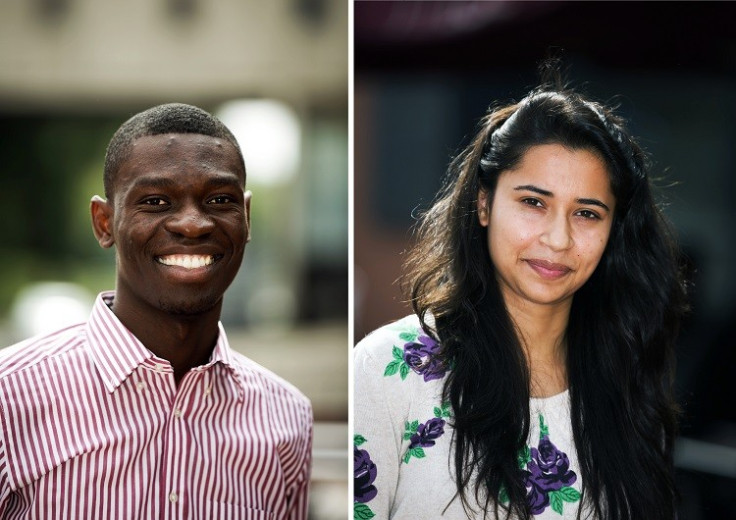Sirius Programme: Meet the Foreign Future Entrepreneurs Britain's Trying to Poach

Britain's Prime Minister David Cameron likes to talk about the competitive "global race" for business and investment, but a new entrepreneurship programme from the government's trade department smacks of mischievous dirty tricks, as though the country's trying to trip up its rivals in the scramble for the finish line.
Launched by UK Trade & Investment, the Sirius Programme will try to pinch budding moguls with innovative start-up ideas away from their countries of origin by offering a tempting support package - a bribe, of sorts - if they head for Albion's shores.
Those foreign students and graduates who apply to be taken onto Sirius and are successful will be given help financing their business idea, mentoring to make it a reality, and logistical support in relocating to the UK where they will set up shop.
"It's brilliant. I think it's very good for anyone who's wanting to start their own business," says Divya Sharma from New Delhi, India, to IBTimes UK.
"It's an all in one solution. You get the finance and then you get the help to move to the country for your business. Then you get the market and most importantly, from my point of view, you get the mentoring."
She added: "You can't do everything by yourself. You have to have someone who is experienced and who can help you out in various conditions."
Sharma, a communications engineering graduate about to embark on a master's degree in Manchester, is developing a product she hopes will make the lives of blind and deaf people easier.
Not everyone knows sign language, putting up a communication barrier between those who rely on it and those who cannot understand it.
So Sharma made a pair of gloves.
Those gloves connect to a computer. When the gloves-wearer uses sign language, the computer reads the symbols and speaks out what is being said with the hands.
"We can have them installed in the market everywhere, such as stations, so [deaf and blind people] won't feel too handicapped," she says.
"Technology helps everyone. Why help somebody who's already able, why not help the disabled? It is important to do a good thing. You will contribute to society. You could go into any business, but I wanted to do this."
Health Vans
Sharma isn't the only person eyeing Sirius through a social lens. Thomas Nketia from Ghana, a PhD student who has been living in the UK for a year, has in his sights the health and wellbeing of those in his home country.
He wants to roll out a system of health vans to offer mobile healthcare provision across the hard-to-access rural areas of Ghana, where poor infrastructure and poverty prevents people from traveling to hospitals for treatment or check-ups.
"What I want to do is take this mobile health van, resource it properly, put a doctor in there, and because it has the capacity to move around and is mobile, it can move from one village to another without necessarily setting up one hospital in one place," Nketia tells IBTimes UK.
Those vans will then have an IT system that allows them to keep digital records of all patients, to make it easier to identify those who come back for treatment and so historical health information is available to doctors.
By providing a system that allows vans to retain identification data on patients, such as fingerprints, it also eases the difficulty of tracking the health of the poorly educated who may not be able to fully identify themselves to doctors.
Despite his drive to do a social good, Nketia is not shy of making profit - but for the right reasons.
"I think that you have to be able to do some good, but I also think you have to be able to pay for it. If you can make profit out of it then that's even better, because you can improve it," he says.
"The idea is to make sure that everyone has access to health and the access that you are creating for them can pay for itself. So it's not just someone giving me a grant to run this. The access itself creates money that can then be put back into the system to improve it."
He says Ghana's national health system would pay for the healthcare provision offered by the mobile vans.
'Everything Starts From Here'
Why choose the UK, though? Why set up here when the economy has faltered so badly?
Why set up here when the government has run unpalatable, high-profile "go home" campaigns against illegal immigration, which have made uncomfortable reverberations among legal immigrants given the resonance with the anti-foreigner racism of the past?
In spite of the apparent hostility in some parts of Britain, and the recent economic turmoil blighting the country, it is still seen by the two aspiring entrepreneurs as a land of wealth and opportunity.
"The skill set is here. The money is here. The government is committed. There is a culture where people are encouraged," says Nketia.
"I've been here for a year and everybody speaks of entrepreneurship. Even in my academic programme, they are talking about business skills and entrepreneurship training."
Sharma says she thinks things are "very equal over here".
"Equal opportunity and the work environment here is very good," she says.
"Everything starts from here. Once you're in the UK, you're in the world. It's like that."
© Copyright IBTimes 2025. All rights reserved.






















